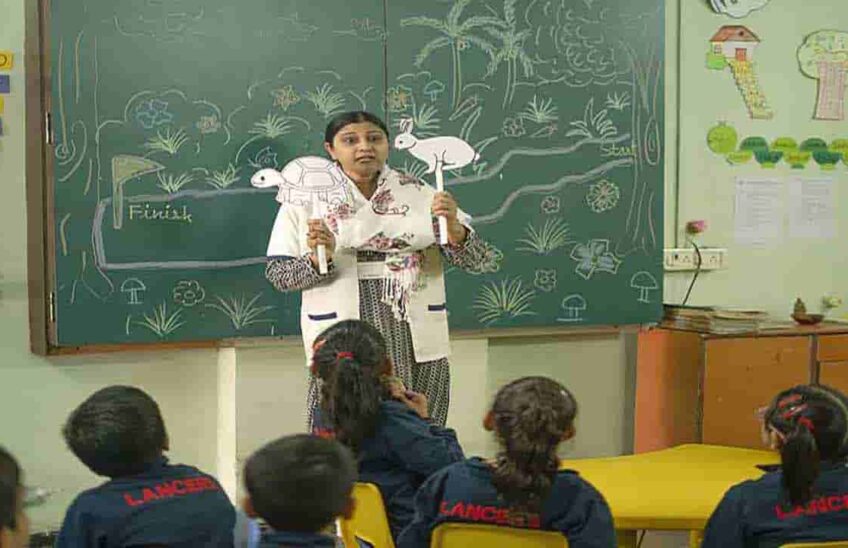
One widely used innovation is the internet. Information is now not only more quickly accessible, but also simpler to obtain. Due to the unfiltered nature of this information, it has created a complicated intellectual period with a wide range of stimuli. These stimuli not only have an impact on children’s cognitive processes, but also emotionally confuse them.
Children and young people should be taught practical skills that will enable them to be distinctive and thrive in social situations for this very reason. Adopting certain fundamental life skills also aids in helping young preschoolers discover their identities and goals in life.
There are many life skills that are important to teach in the CBSE school in Surat, as they can help students become well-rounded individuals and prepare them for success in various aspects of their lives.
What types of life skills can be taught in schools?
1. Communication: Effective communication skills are essential in both personal and professional contexts. Schools can teach students how to communicate clearly, listen actively, and express themselves confidently.
2. Critical thinking: The ability to think critically and solve problems is important in all areas of life. Schools can teach students how to analyse information, make reasoned decisions, and evaluate evidence.
3. Time management: Managing time effectively can help students be more productive and achieve their goals. Schools can teach students how to prioritise tasks, set achievable goals, and avoid procrastination.
4. Financial literacy: Understanding financial concepts and managing money wisely is crucial for personal financial well-being. CBSE boards can teach students how to budget, save, invest, and manage debt.
5. Self-care: Maintaining physical and mental health is essential for overall well-being. Schools in India can teach students how to take care of their bodies, manage stress, and seek help when needed.
6. Collaboration: Working effectively with others is important in many settings, such as school, work, and community. Schools can teach students how to collaborate, negotiate, and resolve conflicts.
7. Digital literacy: As technology becomes more pervasive, it is important for students to learn how to use it safely and effectively. Schools can teach students how to use digital tools, evaluate online sources, and protect their privacy and security.
These are just a few examples of life skills that are important to teach in school. By providing students with the tools and knowledge to succeed in various aspects of their lives, schools can help prepare them for a successful future.
How can teachers help to develop these skills?
Teachers can play a critical role in helping to develop life skills in their students. Here are some ways that teachers can help to develop life skills in the classroom:
1. Model the behavior: Teachers can model positive behaviors and skills, such as effective communication, problem-solving, and time management, for their students. By demonstrating these skills, teachers can help students learn through observation and practice.
2. Create opportunities for practice: Teachers can provide students with opportunities to practise life skills in the classroom, such as group projects, discussions, and role-playing exercises. These activities can help students develop their skills in a safe and supportive environment.
3. Provide feedback: Teachers can provide feedback on students’ performance and progress, highlighting areas of strength and areas for improvement. This feedback can help students understand how they can develop their skills further.
4. Incorporate life skills into lesson plans: Teachers can incorporate life skills into their lesson plans, integrating them into the curriculum in a meaningful way. For example, a history teacher might teach critical thinking skills by analyzing primary sources, while a maths teacher might teach financial literacy by exploring concepts such as interest rates and compound interest.
By focusing on developing life skills in the classroom, teachers can help their students become more well-rounded and prepared for success in various aspects of their lives.
How will it help students to grow in future?
The development of life skills boosts the confidence of a child. You’ll see a marked difference in their communication and collaborative skills. The development of life skills is not only beneficial for all-around development, but also fosters problem-solving abilities. Moreover, a lack of these skills prevents socialising, resulting in negative reactions and behaviours.
Life skills also help students make rational and calculated decisions/actions on their own. Imagine a situation where their parents or teachers may not be available. Taking action and being responsible in such a situation result in a leader’s personality.
Frequently Asked Questions
Q. What are the benefits of teaching life skills in school?
A. Life skills are essential for a successful life, and teaching them in school can help prepare students for the challenges they will face in the future. By teaching life skills in school, students will gain valuable knowledge that can help them make better decisions and lead more productive lives. They will learn how to manage their time, how to communicate effectively with others, how to handle stress and anxiety, and how to be resilient when faced with difficult situations.
Q. What age should schools begin teaching life skills?
A. It is important for children to learn life skills at a young age so that they can develop the skills necessary to make sound decisions and navigate through life’s challenges. Schools should begin teaching these essential life skills as early as elementary school, when children are just beginning to form their own opinions and develop their own unique personalities. By teaching these skills early on, students will be better prepared for the future and be able to handle difficult situations with confidence.
Q. How can schools ensure that students are developing these life skills?
A. In today’s world, developing life skills is essential for success. Schools are in the best position to ensure that students are learning and developing these important life skills. With the right tools, teachers can create engaging activities and lessons that help students learn how to communicate effectively, make decisions, think critically, be creative problem solvers and develop empathy.

